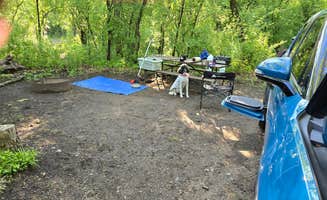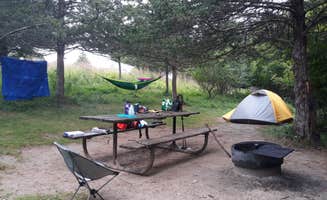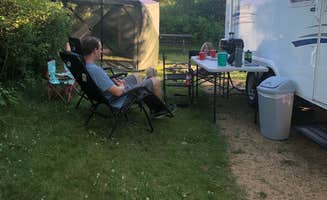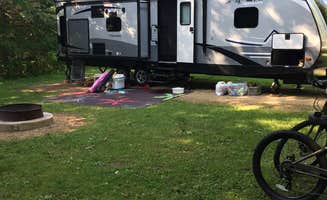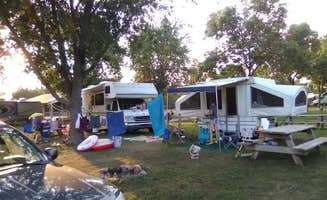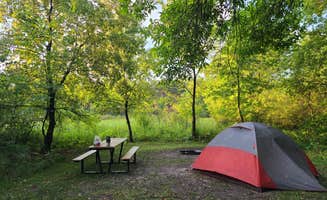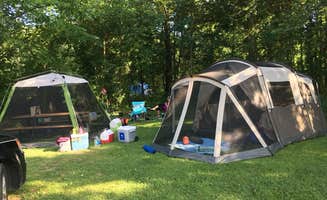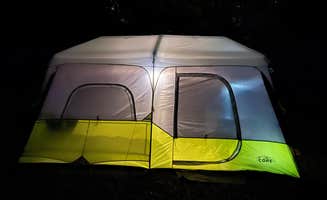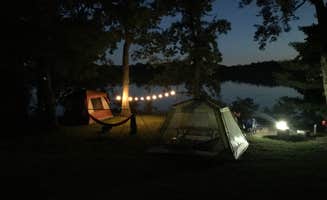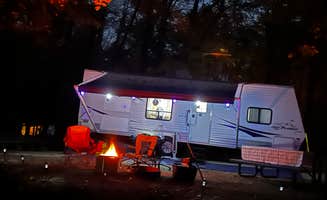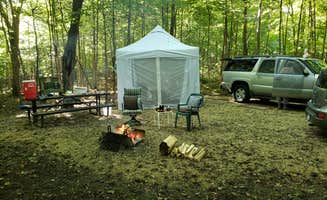Camping options near Lakeland, Minnesota concentrate along the St. Croix River valley, with elevations ranging from 675 to 800 feet above sea level. The region experiences humid continental climate with distinct seasons, including summer temperatures averaging 70-85°F during peak camping months. Many campgrounds in the area maintain winter operations with reduced services, allowing visitors to experience the varied conditions across all four seasons.
What to do
Hiking and trail exploration: Rice Creek Chain of Lakes Regional Park offers extensive trail networks through varied terrain. "There are a bunch of things to do including hiking, horseback riding, swimming in their filtered pond, boating and an insane playground," notes a visitor to Lake Elmo County Park Reserve. The park features "lovely walking trails, nice lake that rents kayaks and canoes," providing multiple activity options.
Water-based recreation: Tubing on the Apple River provides a popular summer activity with organized drop-offs. "Ride to 3 hour tubing right back to the campground," reports a camper at Apple River Family Campground. Some campgrounds offer equipment rentals, while others require visitors to bring their own watercraft or tubes.
Educational opportunities: Several campgrounds maintain nature centers with interpretive displays. "The nature center is nice and a great place to spend some time if it is raining during their open hours," mentions a visitor to Rice Creek Chain of Lakes Regional Park. Interstate State Park features unique glacial potholes with educational signage explaining their formation.
What campers like
Diverse terrain experiences: The region's varied landscapes allow for different camping atmospheres within short distances. At Afton State Park Campground, "The terrain is just hilly enough - and in August - the grass long enough to give the sites a sense of privacy and seclusion." Another camper notes, "The park is laid out kinda funky, but that is a product of it being on the river."
Well-maintained facilities: Many parks invest in quality infrastructure. A visitor to Lebanon Hills Regional Park comments, "Top of the line campground. Surprisingly well spaced sites, facilities modern and clean. Trees galore." At William O'Brien State Park Campground, a camper mentioned, "The shower house needs some paint, but had been cleaned."
Proximity to urban amenities: The region's location allows for convenience while maintaining natural settings. "Convenient location. No problems. Facilities were really well maintained," notes a visitor to Lake Elmo County Park Reserve about its proximity to the Minneapolis airport. Another camper appreciates that "It's close to home and an oasis in the middle of the Twin Cities."
What you should know
Reservation timing matters: Peak season fills quickly, particularly for desirable waterfront sites. "Reserve early online, most weekends were already reserved by mid May," advises a camper at Lebanon Hills Regional Park. Many campgrounds maintain first-come, first-served sites for last-minute campers.
Highway noise impacts some sites: Proximity to roadways affects certain campgrounds. At Hoffman City Park, "This campground is literally adjacent to the highway. You will hear it all night." A visitor to Interstate State Park reports, "The power loop runs right along a 4-lane highway, which you can't really see but for sure will hear."
Variable water access: Water sources and access points differ significantly between campgrounds. "No water at the site. Water nearby at stations," explains a camper at Willow River State Park. At Afton State Park, a visitor warns, "None of the water faucets or water pumps on the trails at Afton State Park are working. The good news is you can fill up on cold drinking water at the visitor center."
Tips for camping with families
Playground accessibility: Many parks feature recently upgraded play equipment. "Great campground, sites are spacious and spread out, electric hookups at all sites, swim pond is great for kids, and other amenities like an archery range and hiking trails are fantastic for kids," shares a visitor to Lake Elmo County Park Reserve.
Consider walk-in versus drive-up sites: Family equipment requirements should dictate site selection. "These sites do require a hike from parking. Would strongly discourage big coolers or lots of weight," advises a visitor to St. Croix Bluffs Regional Park about their carry-in sites. Families with young children may prefer drive-up access.
Wildlife viewing opportunities: Animal sightings enhance family experiences. "We can hear frogs all night and we even saw a turtle laying eggs in a different campsite," shares a camper at William O'Brien State Park. Evening wildlife viewing walks around campgrounds provide educational opportunities for children.
Tips from RVers
Site length considerations: Despite listed dimensions, actual space may vary. "Reservation system is weird and the sites are much bigger than they say. All rv sites are the listed length plus 16' for your tow vehicle, which you need to call to find out," explains a visitor to Lebanon Hills Regional Park.
Varied hookup availability: Water and electrical connections differ between campgrounds and even within loops. "Sites with full hookups or more remote sites with electric that are more tucked away in the pines," notes a camper at Lebanon Hills. At Willow River State Park Campground, "It's big with over a hundred sites, some with power. No water at the site."


